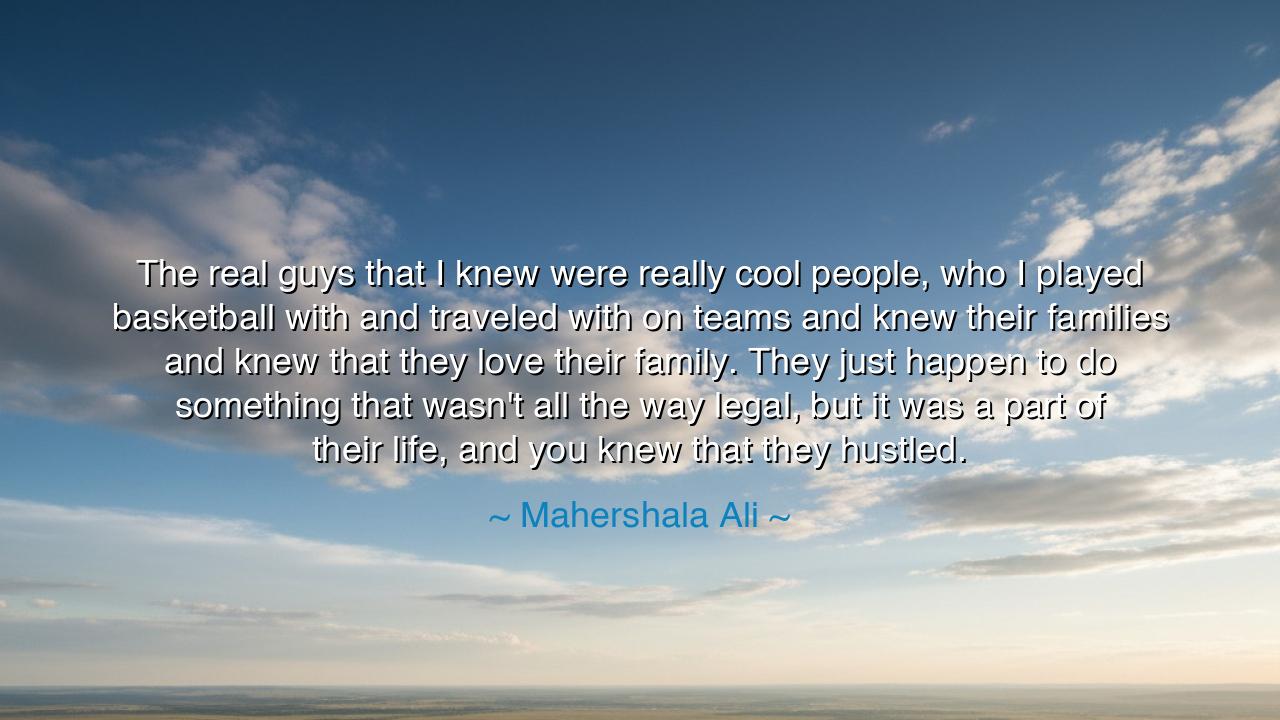
The real guys that I knew were really cool people, who I played
The real guys that I knew were really cool people, who I played basketball with and traveled with on teams and knew their families and knew that they love their family. They just happen to do something that wasn't all the way legal, but it was a part of their life, and you knew that they hustled.






The words of Mahershala Ali resonate with empathy and understanding: “The real guys that I knew were really cool people, who I played basketball with and traveled with on teams and knew their families and knew that they love their family. They just happen to do something that wasn't all the way legal, but it was a part of their life, and you knew that they hustled.” In this reflection lies a profound truth that transcends legality: that human beings are complex, and that character, loyalty, and love often coexist with choices that challenge the law. Ali reminds us that judgment must be tempered with understanding and recognition of context.
The origin of this insight comes from Ali’s personal experience growing up and observing those around him. He speaks of peers whose lives were multifaceted: they displayed love, dedication, and camaraderie, yet engaged in actions deemed unlawful by society. Ali’s observation is a meditation on the duality of human experience — that the law captures behavior, but not the full measure of a person’s morality or heart. This perspective encourages compassion without condoning illegality, highlighting the balance between justice and empathy.
From the perspective of the ancients, Ali’s words echo the teachings of philosophers who understood the complexity of virtue. Aristotle, in his Nicomachean Ethics, emphasized that moral evaluation must consider the whole life of a person, not only isolated actions. The virtuous man was judged by patterns, intentions, and context, not solely by a single misstep. Ali’s insight mirrors this principle: one can recognize the humanity, loyalty, and love in a person while acknowledging that some choices may stray from legal norms.
Consider the historical example of Robin Hood, a figure both mythic and moral in English folklore. While he stole from the rich — actions illegal by the letter of the law — he did so to protect and support his community, displaying loyalty, skill, and care for the vulnerable. Like Ali’s friends, Robin Hood’s life cannot be fully measured by legality alone; it must be understood in terms of his intentions, his character, and the social circumstances that shaped his choices. The law may label him an outlaw, but society sees the complexity of the individual.
Ali also highlights the role of community and relationships in shaping perception of morality. Knowing someone’s family, understanding their dedication, and witnessing their daily struggles provides insight beyond the narrow lens of legality. The ancient Stoics similarly taught that one must cultivate understanding and compassion in evaluating others, recognizing the interplay between circumstance, choice, and character. Ali’s words illuminate the importance of context in moral assessment: a person’s love, loyalty, and work ethic are as integral to their identity as adherence to law.
The reflection also touches on the concept of hustle — the energy, effort, and ingenuity people exert to survive and thrive. While society may judge certain activities as illegal, those acts often emerge from necessity, opportunity, or cultural circumstance. Ancient thinkers like Seneca recognized that human behavior is shaped by forces beyond pure morality: poverty, ambition, and social structures influence decisions. Ali’s statement reminds us to consider these dimensions, understanding that legality alone cannot capture the richness of human life.
The lesson is enduring: recognize complexity, cultivate empathy, and seek to understand the full context of a person’s life. Human beings cannot be reduced to their mistakes; they are defined by relationships, love, loyalty, and the ways they navigate challenges. Ali teaches that the law may judge actions, but wisdom and morality require looking deeper, understanding intentions, and appreciating the broader canvas of life.
Thus, the words of Mahershala Ali endure as a call to compassion and discernment: honor the humanity behind the actions, value relationships and integrity, and recognize that people often walk a fine line between survival, ambition, and legality. By seeing both the struggle and the love in others, one gains a more complete understanding of virtue, justice, and the human condition — and cultivates a wisdom that endures across generations.






AAdministratorAdministrator
Welcome, honored guests. Please leave a comment, we will respond soon